10 Real Estate Software Development Companies in 2025
- February 03
- 9 min

AI in the Lease Management streamlines operations by automating data extraction, tracking key dates, ensuring compliance, and analyzing lease terms for cost savings. It enhances decision-making with predictive analytics, manages risks, and improves efficiency in handling multiple leases, freeing up time for strategic tasks. Lease management often takes a lot of time, effort, and attention to detail, but AI offers a way to simplify and improve these processes.
This article explores how artificial intelligence can support lease management, making tasks like tracking leases, ensuring compliance, and managing tenant communication more efficient. With AI lease management, you can automate repetitive tasks, reduce errors, and access real-time insights that help you make smarter decisions.
Key Takeaways of AI in Lease Management
Adopting AI for lease management is a way to future-proof your property management business, stay competitive in the market, and facilitate your daily operations. Keep reading to discover how AI can transform the way you manage leases for better results and less stress.
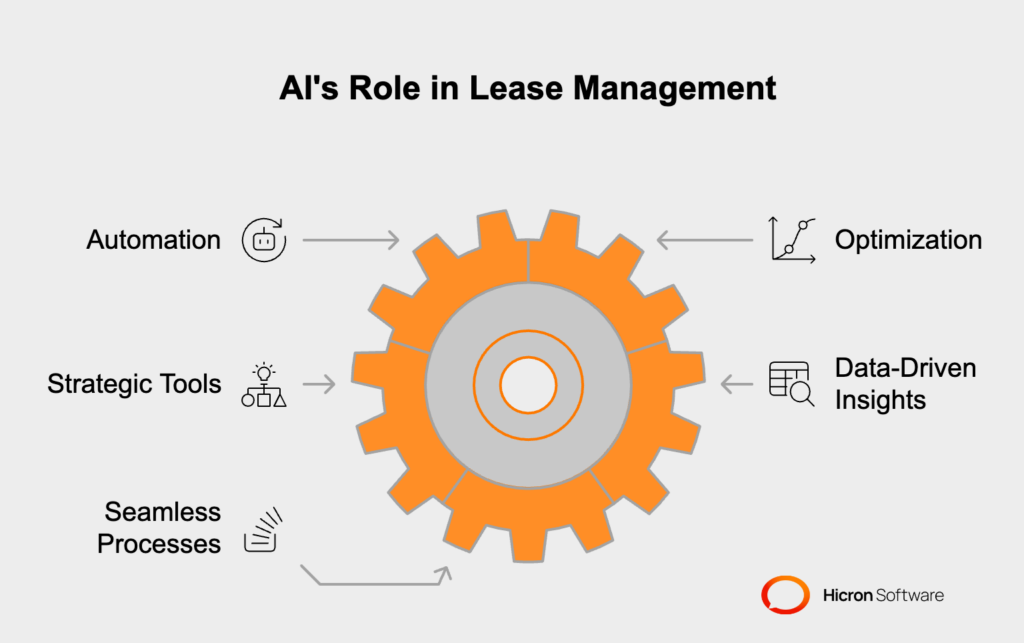
AI in lease management refers to the use of advanced artificial intelligence technologies to streamline and enhance the processes involved in managing property leases. At its core, it automates and optimizes repetitive and detail-oriented tasks, providing property managers with strategic tools to handle leases more effectively and accurately. By leveraging AI, property managers can eliminate inefficiencies associated with traditional workflows, replacing outdated methods with data-driven insights and seamless processes.
Key technologies underpinning AI lease management include:
By combining these technologies, AI lease management tools go beyond automation to deliver actionable recommendations, enhancing efficiency and providing long-term value.
Traditional lease management is often plagued by inefficiencies, creating significant pain points that hinder overall productivity. For instance, tasks such as manual data entry, document review, and compliance checks are not only time-consuming but prone to human error, which can lead to costly mistakes. Additionally, managing complex lease portfolios with varying terms, deadlines, and tenant demands becomes increasingly challenging as property managers scale their operations.
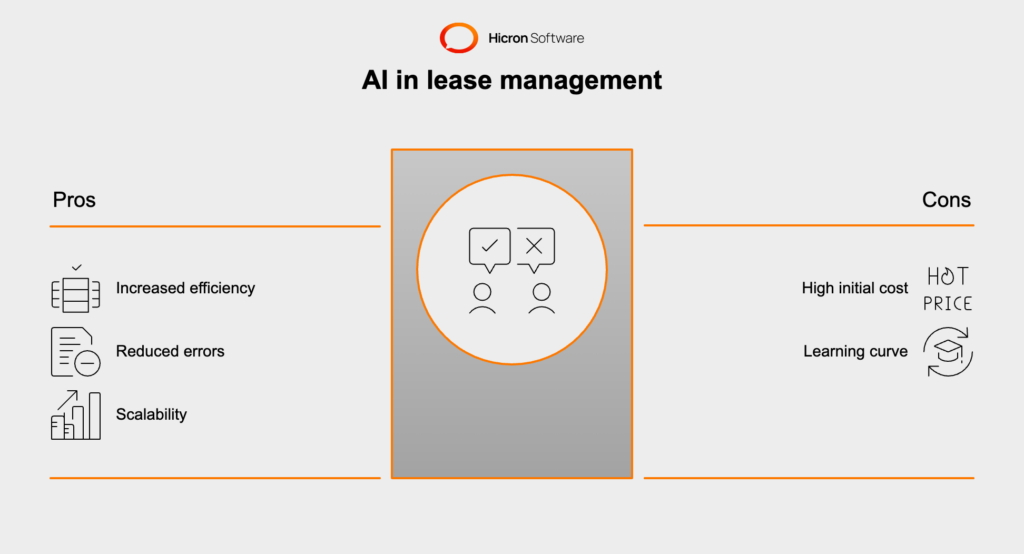
AI in lease management addresses these challenges head-on by introducing automation, precision, and strategic intelligence into the process. Here’s how it makes an impact:
Leveraging AI in lease management isn’t just a solution for existing issues; it’s a strategic component of modern property management that ensures long-term competitiveness. By transitioning to AI-driven tools, property managers can redefine their workflows, mitigate risks, and position their operations to meet the demands of tomorrow’s real estate industry.
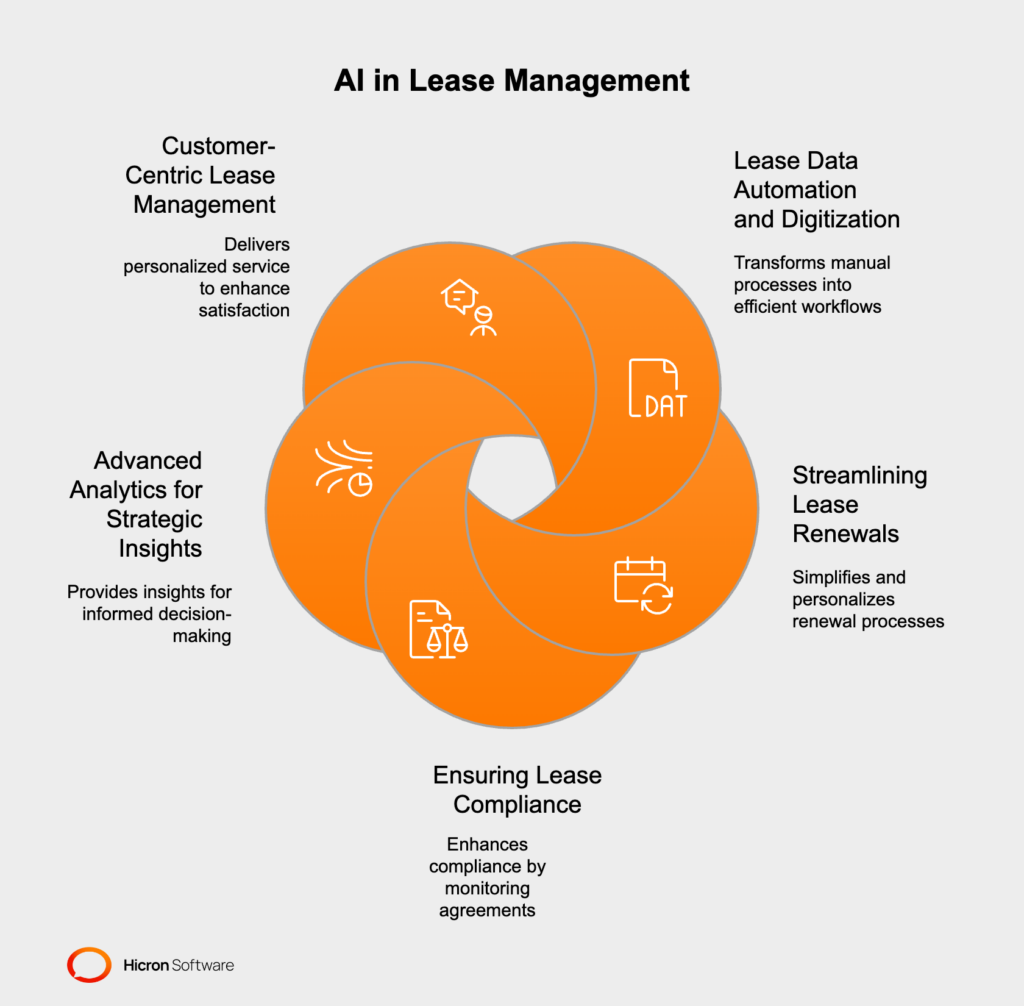
AI in lease management fibs in its ability to transform traditional manual processes into highly efficient workflows through automation. AI-powered systems extract and digitize key information from lease agreements, such as terms, expiration dates, payment details, and regulatory clauses. Natural language processing (NLP) algorithms ensure that even complex or unstructured lease documents are accurately interpreted and organized into structured data.
This automation eliminates the tedious manual data entry, reducing the risk of human error while ensuring that lease information is easily accessible and centralized. Property managers can retrieve accurate data, enabling faster decision-making and smoother operational flow. By streamlining data management, AI paves the way for better resource allocation and a stronger focus on strategic objectives.
Managing lease renewals is often a resource-intensive task, requiring careful tracking of expiration dates, tenant preferences, and market conditions. AI simplifies and personalizes lease renewal processes by automating critical steps. Advanced algorithms proactively monitor lease timelines and send timely reminders to property managers and tenants, reducing the likelihood of missed deadlines.
AI systems can analyze historical and real-time data to assess tenants’ behaviors and preferences. This allows property managers to tailor renewal offers accordingly. By streamlining communication and forecasting potential renewal outcomes, AI helps property managers maintain high retention rates and fosters stronger tenant relationships. The efficiency gained from automated renewals saves time, mitigates risks, and ensures continuity in leasing operations.
Lease compliance is critical, yet highly complex, due to the legal, regulatory, and financial obligations associated with property management. AI greatly enhances compliance by continually monitoring lease agreements and identifying potential risks or discrepancies. Using advanced algorithms, AI is capable of flagging missing clauses, identifying obligations that require immediate attention, and ensuring alignment with local regulations and contractual standards.
This proactive approach minimizes the likelihood of disputes and penalties, safeguarding both legal and financial interests. AI-powered compliance checks also provide peace of mind by automating this traditionally burdensome process. Property managers can rely on real-time compliance monitoring to maintain trust with tenants and uphold business integrity.
AI-driven analytics enables property managers to track and evaluate key performance indicators (KPIs) across their lease portfolio. These metrics include lease occupancy rates, tenant satisfaction trends, market rent comparisons, and renewal probabilities.
By analyzing this data, AI tools can generate actionable insights to inform pricing strategies, lease negotiations, and tenant outreach plans. For example, predictive analytics can forecast market shifts, allowing property managers to stay ahead of changes in demand or pricing dynamics. This level of intelligence transforms data into a competitive advantage, enabling more informed, proactive, and profitable decision-making.
Tenants increasingly expect personalized service, and AI plays a pivotal role in delivering tailored experiences that enhance tenant satisfaction. By analyzing
AI can predict needs and provide solutions before tenants even raise a concern. This proactive capability delivers an enhanced level of service that fosters stronger tenant relations and loyalty.
AI is also instrumental in improving communication. Intelligent chatbots, for example, can handle routine inquiries 24/7, ensuring tenants receive timely and accurate responses. Beyond communication, AI can identify patterns such as frequent maintenance requests, allowing property managers to address issues preemptively.
By integrating predictive and customized services into leasing operations, AI fosters a tenant-friendly environment that encourages long-term occupancy and helps build a positive reputation.
Introducing AI into your lease management tech stack can be a game-changer. Yet, success hinges on a thoughtful approach to selecting the right solutions. Unlike replatforming, which entails replacing systems, building an AI-driven lease management platform focuses on integrating AI tools to enhance your current tech ecosystem. This strategy ensures a less disruptive implementation process while maximizing the potential of your existing lease management systems.
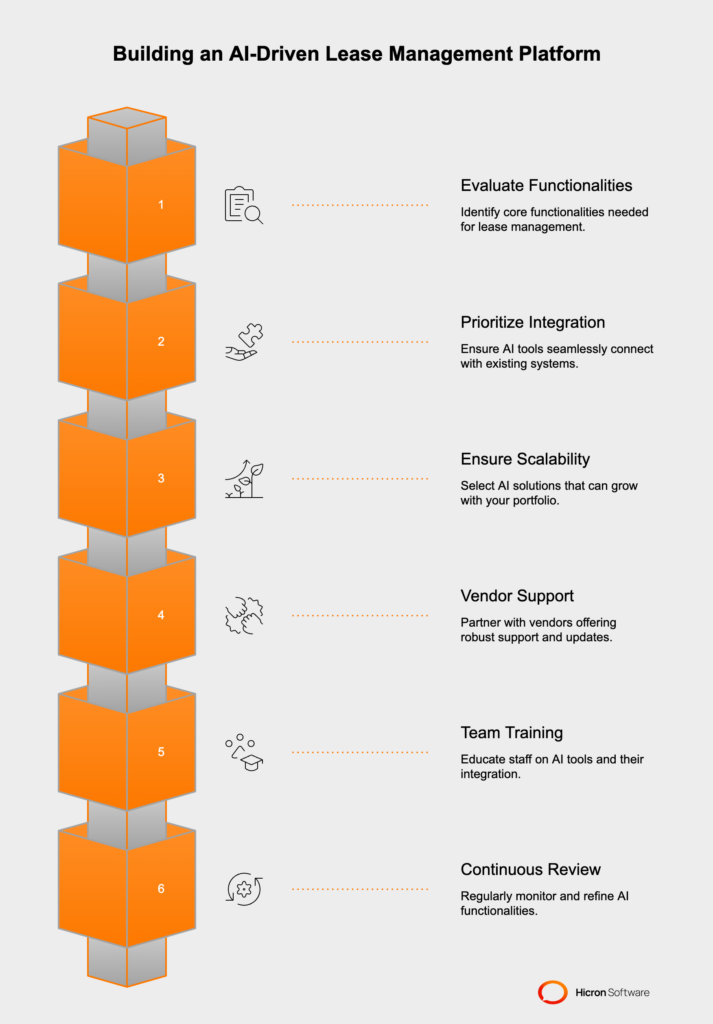
Step 1: Evaluating Core Functionalities
Start by identifying the core functionalities required to address your operational needs. AI tools should support essential tasks like
For example, AI-driven compliance monitoring can help flag potential risks, while predictive analytics can provide actionable insights to guide pricing strategies and tenant retention efforts. Ensuring these functionalities align with your business objectives is vital for achieving meaningful results.
Step 2: Prioritizing Integration
A critical aspect of building an AI-driven platform is ensuring the chosen solutions complement your current systems. Evaluate integration capabilities, focusing on tools that connect to your existing CRM, accounting, or property management software. A well-integrated system minimizes workflow disruptions, allowing your team to continue operating efficiently while reaping the benefits of AI.
Step 3: Ensuring Scalability and Usability
Select AI solutions that are designed with scalability in mind. Your platform should grow in tandem with your portfolio, adapting to increasing data volumes, expanding into new regions, or addressing new operational needs. Prioritize user-friendly tools that reduce training time and encourage widespread adoption among your team. An intuitive interface fosters confidence, enabling property managers to maximize the technology’s potential.
Step 4: The Role of Vendor Support
Partnering with a vendor that provides robust support is essential for the long-term success of your AI-driven platform. Look for vendors who offer comprehensive troubleshooting, regular product updates, and a dedicated support team to assist with any challenges. Reliable support ensures smooth operations and helps your platform stay ahead of technological advancements.
By focusing on enhancing your existing tech stack with AI tools designed for compatibility and growth, you can elevate your lease management processes. This approach improves decision-making and keeps your operations agile and competitive in the evolving real estate landscape.
Step 5: Team Training and Process Integration
Proper training is crucial for ensuring the successful adoption of AI. Educate property managers and support staff on AI tools, their functionalities, and how they integrate with daily tasks. Training sessions should focus on the practical application of tools, such as extracting lease data or running compliance checks.
Standardized workflows should be established to ensure consistency in AI integration. Assign clear roles, ensuring every team member understands their responsibilities when using new systems. Additionally, create a support structure, such as a dedicated helpdesk or internal champions, to provide ongoing learning and troubleshoot issues as they arise.
Step 6: Continuous Review and Optimization
AI adoption in real estate is not a one-time effort; continuous monitoring and refinement are necessary to achieve long-term success. Track metrics like
Solicit staff feedback regularly, using their insights to refine AI functionalities and improve customization. Similarly, stay informed about the latest AI developments to unlock new optimizations that enhance system performance. Regular reviews ensure that your platform evolves in tandem with your business needs and industry trends, thereby maintaining a competitive edge.
Integrating AI into lease management doesn’t mean starting from scratch. With advancements in Natural Language Processing (NLP) and Large Language Models (LLMs), property managers can enhance their operations efficiently while customizing solutions to meet their unique needs. These technologies are transforming the way lease management tasks are handled by simplifying and streamlining processes.
To understand how these technologies work in lease management, it’s helpful to know the distinction between NLP and LLMs:
While NLP gives AI the ability to work with language, LLMs take it further by performing specific, high-level tasks with remarkable accuracy and adaptability.
Here’s how these technologies apply to lease management:
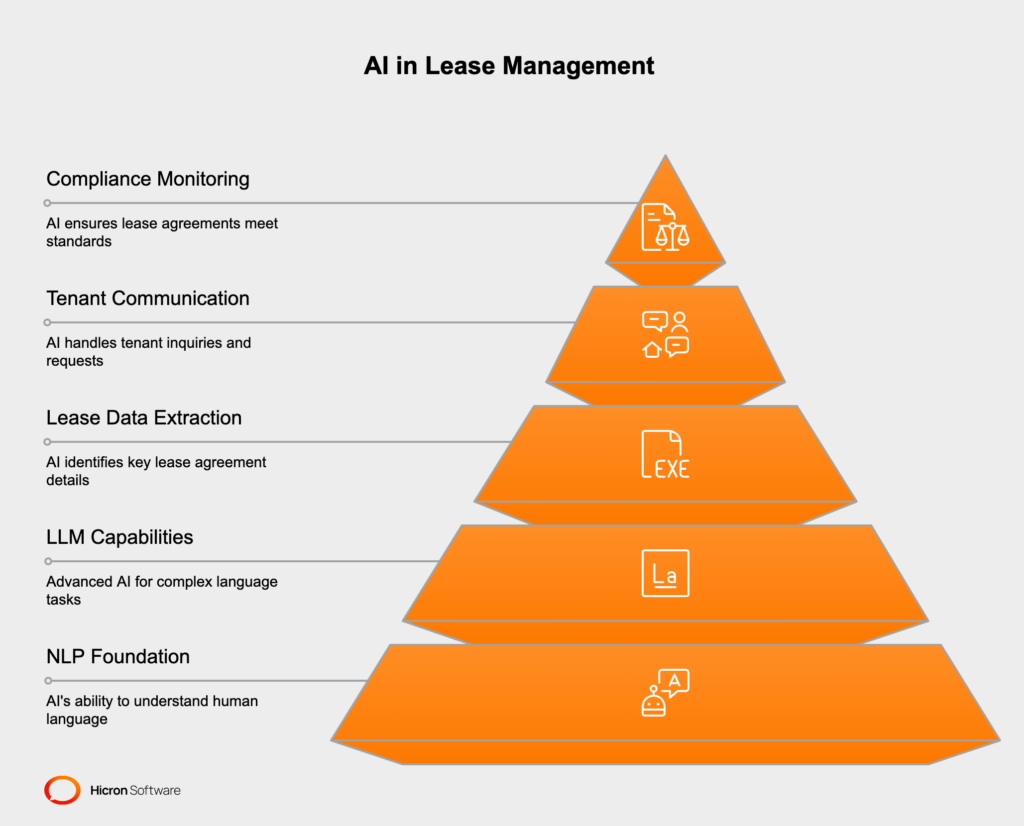
By combining the foundational strength of NLP with the advanced capabilities of LLMs, property managers can tackle a wide range of challenges in lease management. The flexibility of LLMs allows property managers to train these models to handle domain-specific use cases, turning them into invaluable tools in managing critical lease management tasks.
A practical way to introduce AI into your lease management tech stack is through fractional implementation. Rather than overhauling operations all at once, you can start by gradually integrating AI tools into high-impact areas. This approach minimizes potential disruptions and enables your team to adapt to changes with ease.
Some actionable steps to get started with fractional implementation include:
By combining ready-made large language models (LLMs) with a fractional implementation strategy, property managers can build an effective, AI-driven lease management platform that scales with their business needs. This approach not only enhances operational efficiency but also reduces hesitation among teams, setting the stage for broader AI adoption across the organization.
The estimated timeline for implementing AI in lease management can vary widely depending on factors like the complexity of the tasks, the readiness of your existing tech stack, and the scale of deployment.
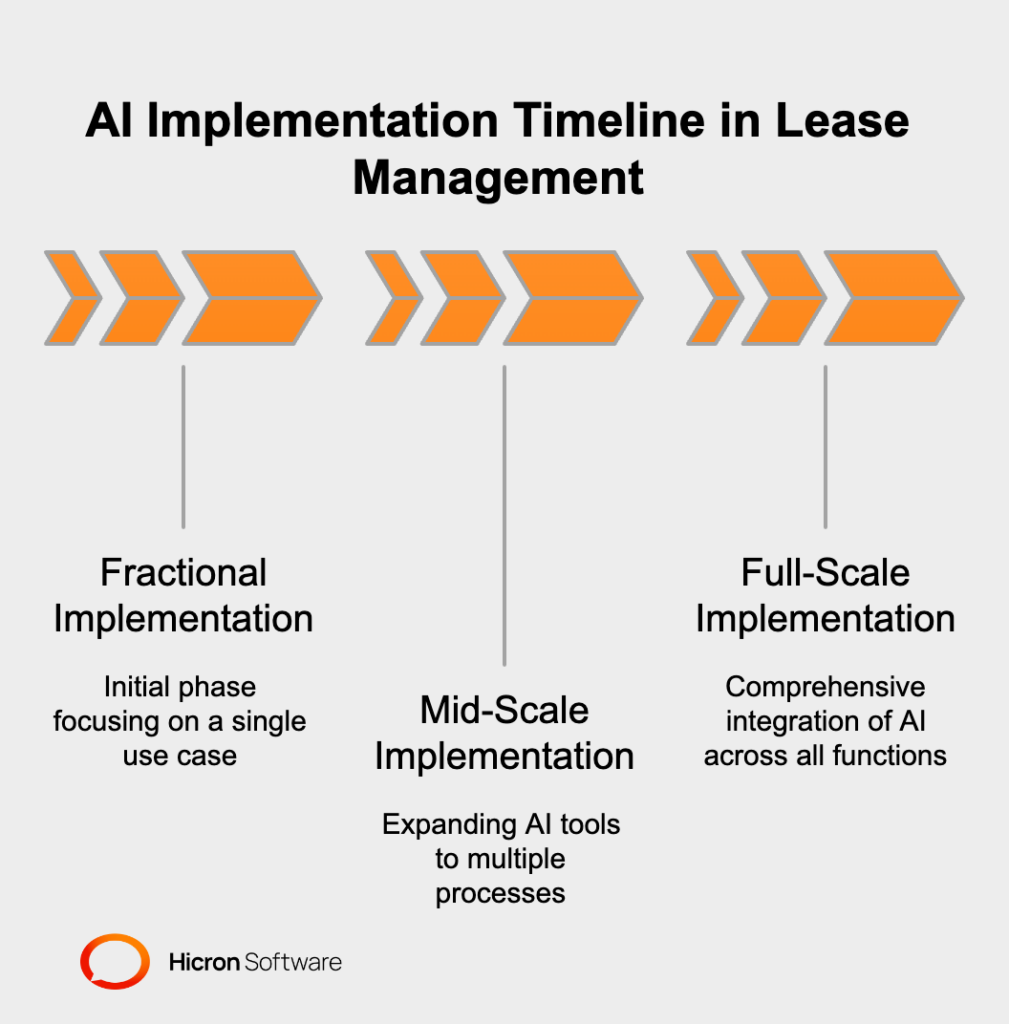
Here’s a breakdown:
|
Implementation Type |
Timeline |
What’s Involved |
Key Notes |
|
Fractional Implementation |
1-3 months |
|
Focused scope and minimal disruption to existing operations. |
|
Mid-Scale Implementation |
3-6 months |
|
Requires more coordination between teams and vendors. |
|
Full-Scale Implementation |
6-12 months or more |
|
Larger scope, more complex integrations, and the need for robust change management. |
Resistance to AI adoption often stems from fear of the unknown, concerns over job security, or doubts about the technology’s reliability. Staff may worry that AI tools will replace their roles, while stakeholders might hesitate due to potential disruptions during the implementation process.
Engage your team early in the process by involving them in platform selection and pilot testing phases. This inclusion helps them feel valued and mitigates resistance by addressing their concerns firsthand.
Hands-on training ensures they are comfortable with the technology. For stakeholders, provide measurable objectives to align AI integration with broader business goals, showcasing its return on investment.
Ensuring Data Security and Privacy Standards
Lease agreements contain sensitive information about tenants and businesses that must be protected. Failing to secure data can lead to breaches, regulatory fines, and damaged trust. Implementing data security practices is, therefore, non-negotiable when adopting AI.
You should integrate advanced encryption protocols to prevent unauthorized access to data, both in transit and at rest. Establishing multi-tier access controls ensures that only authorized personnel can view or edit sensitive information. Beyond securing the data itself, verify that your AI-powered lease management platform complies with industry regulations such as GDPR or CCPA, depending on your operational regions.
The integration process provides an opportunity to audit existing security measures and upgrade them where necessary. Collaborate closely with IT teams or consultants to ensure seamless alignment of AI tools with security and compliance standards, mitigating risks associated with improper data handling.
Mitigating Risks of Underperformance
Underutilization and poor system integration are two common pitfalls in AI lease management adoption. New AI tools can fall short of expectations if employees underuse them or if the systems fail to operate with existing platforms.
To mitigate these risks:
To determine the impact of AI on lease management, it’s essential to track key performance metrics that reflect both operational efficiency and tenant satisfaction.
Regularly monitoring this data ensures that AI tools meet both business and client expectations.
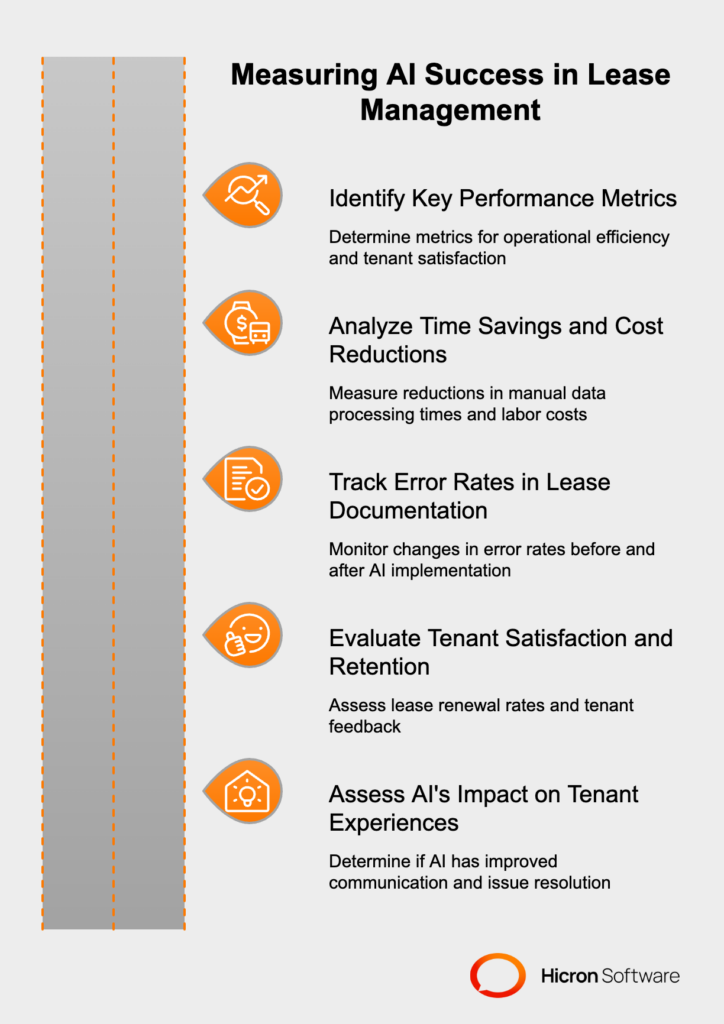
The return on investment (ROI) for AI adoption goes beyond immediate financial returns. To accurately connect AI implementation to business outcomes, track metrics that tie to tangible results, such as higher lead conversion rates or improved portfolio management efficiency. For example, a platform that automates renewal processes can directly lead to faster lease turnarounds and reduced administrative costs.
Long-term tracking is equally important. Monitor recurring savings generated by automation, such as decreased compliance penalties or improved operational productivity over time. This cumulative data validates the upfront investment in AI tools and justifies scaling their usage across other facets of property management.
Realizing the full potential of AI requires a forward-thinking strategy.
Regularly revisiting the roadmap and incorporating feedback from both staff and tenants will help refine the AI strategy, ensuring it remains aligned with your organizational goals and continues delivering measurable value.
The future of lease management is being shaped by technologies that boost efficiency and precision. Innovations such as real-time analytics enable property managers to monitor lease performance and tenant behavior in real-time, providing actionable insights.
|
Aspect |
Key Innovations/Actions |
Benefits/Opportunities |
|
Technological Advancements |
|
|
|
Adaptability for Success |
|
|
Advanced tenant profiling, powered by AI, can help anticipate tenant needs and preferences, leading to improved retention rates. AI-driven contract drafting is streamlining the creation of error-free, customized lease agreements. As machine learning models and IoT devices continue to advance, opportunities for automating and enhancing lease-related processes will only expand.
AI is evolving into a vital tool for property managers, making adaptability essential for long-term success. Those who proactively explore and adopt new tools stand to gain a significant competitive edge. Staying open to experimentation with emerging technologies, such as predictive analytics or proactive maintenance solutions driven by IoT, ensures businesses remain equipped to address market changes and tenant demands. By leveraging these advancements, property managers can position themselves as leaders in a rapidly transforming industry.
AI lease management has become an essential tool for modern property managers, delivering unparalleled benefits in efficiency, accuracy, and tenant satisfaction. By automating routine tasks, minimizing errors, and providing data-driven insights, AI empowers property managers to focus on strategic growth and better tenant experiences.
Take an informed step toward integrating AI solutions into your lease management processes. By doing so, you’ll not only enhance operational excellence but also gain a competitive edge in a dynamic industry. Start exploring how AI can transform your property management approach today. Get in touch!
AI is used in contract management to automate tasks like drafting, reviewing, and analyzing contracts. It can identify key terms, flag risks, and ensure compliance with regulations. AI-powered tools also enable faster contract negotiation by providing insights and suggesting changes, reducing the time spent on manual reviews.
AI supports property management by automating routine tasks, such as tenant screening, rent collection, and maintenance scheduling. It can analyze tenant behavior to predict potential issues, optimize rent pricing, and improve overall efficiency. AI chatbots are also becoming common for handling tenant FAQs and support requests.
AI plays a major role in financial management by providing predictive analytics for budgeting and forecasting. It helps lease managers and landlords track income, expenses, and ROI. Additionally, AI can flag fraudulent activities, automate invoice processing, and streamline lease accounting.
Landlords can use AI to simplify tasks such as tenant screening, lease management, setting rental prices, and handling maintenance requests. AI-powered tools can analyze market trends to determine optimal rental rates and improve tenant interactions through automated chatbots for faster responses.
AI is changing contracts by making the creation, review, and management process faster and more efficient. AI tools can recognize patterns, highlight risks, and ensure compliance with laws or company policies. They also enable smooth collaborations by identifying discrepancies in negotiations earlier in the process.
AI is used in real estate for property recommendations, market analysis, and lead generation. It helps predict property values, improve marketing strategies with targeted ads, and automate tasks like scheduling viewings and answering client queries. AI can also analyze trends to forecast market changes, offering valuable insights for better decision-making.
AI revolutionizes property management by automating processes like tenant queries, maintenance requests, and lease renewals. Smart algorithms enhance decision-making by offering insights into operational efficiency and tenant satisfaction. Real-time analytics provided by AI also help property managers optimize energy usage and reduce costs.
AI improves asset management by providing predictive analytics for maintenance and performance tracking. It can help managers monitor lease assets like properties, vehicles, or equipment efficiently. AI also streamlines monitoring by giving alerts on contract expiration, renewals, or asset depreciation trends.
An AI leasing agent is a virtual assistant that automates leasing tasks, such as answering inquiries from prospective tenants, scheduling tours, and processing lease applications. These tools help improve customer experiences and save time for property managers by handling repetitive and administrative tasks.
The most commonly used forms of AI in real estate include machine learning, chatbots, and predictive analytics. Machine learning models analyze market trends and forecast property values, while chatbots handle tenant and client interactions. Predictive analytics assists in decision-making by identifying patterns in data to optimize property operations and pricing.
